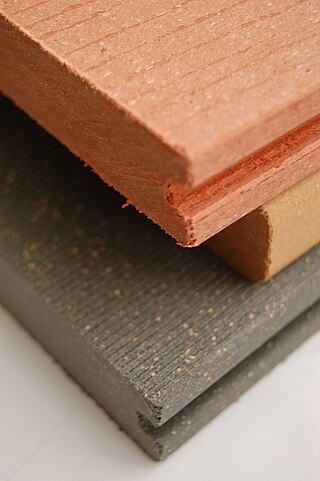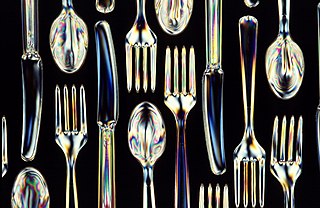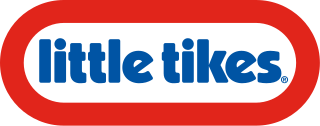Celluloids are a class of materials produced by mixing nitrocellulose and camphor, often with added dyes and other agents. Once much more common for its use as photographic film before the advent of safer methods, celluloid's common present-day uses are for manufacturing table tennis balls, musical instruments, combs, office equipment, fountain pen bodies, and guitar picks.

A tea bag or teabag is a small, porous, sealed bag or packet, typically containing tea leaves or the leaves of other herbs, which is immersed in water to steep and make an infusion. Originally used only for tea, they are now made with other tisanes as well.

Celanese Corporation, formerly known as Hoechst Celanese, is an American technology and specialty materials company headquartered in Irving, Texas. It is a Fortune 500 corporation. The company is the world's leading producer of acetic acid, producing about 1.95 million tonnes per year, representing approximately 25% of global production. Celanese is also the world's largest producer of vinyl acetate monomer (VAM).

Bagasse is the dry pulpy fibrous material that remains after crushing sugarcane or sorghum stalks to extract their juice. It is used as a biofuel for the production of heat, energy, and electricity, and in the manufacture of pulp and building materials. Agave bagasse is similar, but is the material remnants after extracting blue agave sap.
Eastman Chemical Company is an American company primarily involved in the chemical industry. Once a subsidiary of Kodak, today it is an independent global specialty materials company that produces a broad range of advanced materials, chemicals and fibers for everyday purposes. Founded in 1920 and based in Kingsport, Tennessee, the company operates 36 manufacturing sites worldwide and employs approximately 14,000 people.

A plasticizer is a substance that is added to a material to make it softer and more flexible, to increase its plasticity, to decrease its viscosity, and/or to decrease friction during its handling in manufacture.

Otto fuel II is a monopropellant mixture of chiefly propylene glycol dinitrate that is used to drive torpedoes and other weapon systems. It was invented by Otto Reitlinger in 1963. Otto fuel II, sometimes known simply as Otto fuel, is not related to the Otto cycle; it is named after Reitlinger and for being the second iteration of the fuel. It was developed by the US Navy and the first torpedo to use it was the Mark 48 torpedo in the 1960s.

Wood–plastic composites (WPCs) are composite materials made of wood fiber/wood flour and thermoplastic(s) such as polyethylene (PE), polypropylene (PP), polyvinyl chloride (PVC), or polylactic acid (PLA).
Cellulosic ethanol is ethanol produced from cellulose rather than from the plant's seeds or fruit. It can be produced from grasses, wood, algae, or other plants. It is generally discussed for use as a biofuel. The carbon dioxide that plants absorb as they grow offsets some of the carbon dioxide emitted when ethanol made from them is burned, so cellulosic ethanol fuel has the potential to have a lower carbon footprint than fossil fuels.

Plastic shopping bags, carrier bags, or plastic grocery bags are a type of plastic bag used as shopping bags and made from various kinds of plastic. In use by consumers worldwide since the 1960s, these bags are sometimes called single-use bags, referring to carrying items from a store to a home. However, it is rare for bags to be worn out after single use and in the past some retailers incentivised customers to reuse 'single use' bags by offering loyalty points to those doing so. Even after they are no longer used for shopping, reuse of these bags for storage or trash is common, and modern plastic shopping bags are increasingly recyclable or compostable - at the Co-op for example. In recent decades, numerous countries have introduced legislation restricting the provision of plastic bags, in a bid to reduce littering and plastic pollution.

Iogen Corporation is a Canadian company based in Ottawa, Ontario, Canada, and was founded by Patrick Foody Sr. in 1975.

Bioplastics are plastic materials produced from renewable biomass sources, such as vegetable fats and oils, corn starch and rice starch, straw, woodchips, sawdust, recycled food waste, etc. Some bioplastics are obtained by processing directly from natural biopolymers including polysaccharides and proteins, while others are chemically synthesized from sugar derivatives and lipids from either plants or animals, or biologically generated by fermentation of sugars or lipids. In contrast, common plastics, such as fossil-fuel plastics are derived from petroleum or natural gas.

Lignocellulose refers to plant dry matter (biomass), so called lignocellulosic biomass. It is the most abundantly available raw material on the Earth for the production of biofuels. It is composed of two kinds of carbohydrate polymers, cellulose and hemicellulose, and an aromatic-rich polymer called lignin. Any biomass rich in cellulose, hemicelluloses, and lignin are commonly referred to as lignocellulosic biomass. Each component has a distinct chemical behavior. Being a composite of three very different components makes the processing of lignocellulose challenging. The evolved resistance to degradation or even separation is referred to as recalcitrance. Overcoming this recalcitrance to produce useful, high value products requires a combination of heat, chemicals, enzymes, and microorganisms. These carbohydrate-containing polymers contain different sugar monomers and they are covalently bound to lignin.

Biodegradable plastics are plastics that can be decomposed by the action of living organisms, usually microbes, into water, carbon dioxide, and biomass. Biodegradable plastics are commonly produced with renewable raw materials, micro-organisms, petrochemicals, or combinations of all three.
Renewable fuels are fuels produced from renewable resources. Examples include: biofuels, Hydrogen fuel, and fully synthetic fuel produced from ambient carbon dioxide and water. This is in contrast to non-renewable fuels such as natural gas, LPG (propane), petroleum and other fossil fuels and nuclear energy. Renewable fuels can include fuels that are synthesized from renewable energy sources, such as wind and solar. Renewable fuels have gained in popularity due to their sustainability, low contributions to the carbon cycle, and in some cases lower amounts of greenhouse gases. The geo-political ramifications of these fuels are also of interest, particularly to industrialized economies which desire independence from Middle Eastern oil.
Second-generation biofuels, also known as advanced biofuels, are fuels that can be manufactured from various types of non-food biomass. Biomass in this context means plant materials and animal waste used especially as a source of fuel.

Little Tikes is an American manufacturer of children's toys, with headquarters and manufacturing located in Hudson, Ohio. The company also has other manufacturing and distribution facilities in Asia and Europe. Little Tikes' products are mostly low-tech molded plastic toys aimed primarily at infants and young children, for indoor and outdoor use, including its party kitchen and turtle sandbox.

Plastics are a wide range of synthetic or semi-synthetic materials that use polymers as a main ingredient. Their plasticity makes it possible for plastics to be molded, extruded or pressed into solid objects of various shapes. This adaptability, plus a wide range of other properties, such as being lightweight, durable, flexible, and inexpensive to produce, has led to their widespread use. Plastics typically are made through human industrial systems. Most modern plastics are derived from fossil fuel-based chemicals like natural gas or petroleum; however, recent industrial methods use variants made from renewable materials, such as corn or cotton derivatives.
Zeoform is a material developed by the Australian company, Zeo IP Pty made from water and cellulose. Polymeric lignocellulosic fibres from industrial biomass are used to produce a structural material suitable for various applications in the industrial sector. Depending on the source material it is non-toxic, biodegradable, and that it could replace many forms of hard plastics, synthetic compounds and other polymers.

Conservation and restoration of objects made from plastics is work dedicated to the conservation of objects of historical and personal value made from plastics. When applied to cultural heritage, this activity is generally undertaken by a conservator-restorer.












